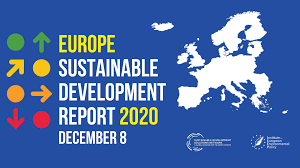
https://www.sdgindex.org/reports/europe-sustainable-development-report-2...
The Covid-19 pandemic is a setback for sustainable development in Europe and the rest of the world. The EU is still in the midst of the health crisis and the urgent priority remains the suppression of the virus. Compared with countries in the Asia-Pacific, EU countries record more cases and deaths from COVID-19. Learning the lessons from the current crisis and strengthening EU’s preparedness, coordination and resilience for pandemics is key to achieve SDG target 3.d but also to prepare Europe for other critical risks including climate risks.
The SDGs and Paris Climate Agreement provide a roadmap for a sustainable, inclusive and resilient recovery. The recovery should aim to make the EU more sustainable, inclusive and resilient based on the European Green Deal and addressing all 17 SDGs. The Next Generation EU – COVID-19 recovery package as well as the next Multiannual Financial Framework (MFF 2021-2027) offer the chance to put Europe’s recovery and future on a sustainable path. 2021 can be the “Super Year” for the SDGs and Climate and biodiversity action. It will provide opportunities for the EU and its member states to play a leadership role in sustainable development and to streamline the SDGs and Paris Climate Agreement in international events, including the COP Climate, the COP Biological Diversity (CBD), the World Food Summit as well as the High-Level Political Forum, UNGA and G20 meetings. The commitment made by China to achieve climate neutrality and other similar pledges made recently by several countries around the world can provide a momentum for accelerated actions and transformations for a sustainable future.
Building on its well-received first edition 2019, the ESDR2020 provides an updated SDG Index and Dashboards for the EU, EU member states and partner countries as well as recommendations to strengthen the implementation of the SDGs and European Green Deal.
This report was made possible thanks to the support of the German Federal Ministry of the Environment, Nature Conservation and Nuclear Safety (BMU) and the German Federal Ministry for Economic Cooperation and Development (BMZ). We are also grateful for the support provided by the Heinrich-Böll-Stiftung and the European Network of Political Foundations. The report was produced by SDSN and IEEP in collaboration with the European Economic and Social Committee (EESC), SDSN Germany, and other national and regional SDSN networks in Europe.










Add new comment